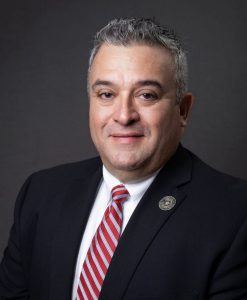SAN BENITO — The 13th Court of Appeals has ruled a trial judge’s decision “interfered” with San Benito’s Nov. 5 special election, while city commissioners properly placed proposed City Charter amendments on the ballot.
 Fred Sandoval
Fred SandovalIn its decision, the appeals court overturned visiting state District Judge Michael Garcia’s ruling, allowing the city to adopt four City Charter amendments which voters approved in the election.
“The trial court’s orders represented an impermissible exercise of judicial power that interfered in the political process,” the court found, referring to Garcia’s ruling nullifying the election’s votes.
As a result of the appeals court decision, City Manager Fred Sandoval said he will live in town based on voters’ rejection of a proposition that would have have allowed the city manager to live outside the city limits.
While the City Charter requires the city manager to live within the city limits, Sandoval’s continued living in Pharr since he was hired in October 2023.
“I will reside in San Benito as per City Charter requirements and I am processing my application to become a registered voter as well,” he said Wednesday.
Sandoval called the appeals court ruling a “great victory for us.”
“I’m glad the appeals court saw it the way we saw it and ruled in our favor,” Mayor Rick Guerra said in an interview. “I feel that what we did was right. The voters read what was on the ballot. They were informed.”
Now, Julian Rios, the former president of the city’s Economic Development Corporation, said he plans to meet with his attorneys to determine if he’ll take further legal action.
“I don’t know what victory they’re celebrating because citizens voted the city manager had to live in town, which is the biggest item on the ballot that they snuck past the citizens,” he said in an interview, referring to commissioners.
In an Oct. 17 lawsuit, Rios argued commissioners violated the Texas Open Meetings Act, failing to give residents proper notice of the special election and its five proposed City Charter amendments while claiming they secretly placed the propositions on the ballot.
As the case played out in court, the city was holding the election’s early voting period.
Then on Nov. 4, Garcia ruled in favor of Rios, finding commissioners failed to give residents proper notice of the election before voiding citizens’ votes.
During a hearing, Wayne Dolcefino, the owner of Houston-based Dolcefino Consulting who’s being paid to investigate the city, testified he paid $5,000 to file the lawsuit in court, City Attorney Javier Villalobos said.
On Friday, the appeals court overturned Garcia’s decision, finding commissioners gave voters proper notice of the election while adding Garcia’s ruling interfered with the electoral process.
“We conclude that the notice adequately informed the public of the subject matter at issue,” Justice Clarissa Silva wrote in the court’s ruling. “The notice advised the public that the city commission would consider and potentially approve a specifically identified order.”
 A “vote here” sign is seen at the San Benito Community Center building on Tuesday, Nov. 5, 2024, in San Benito. (Miguel Roberts/The Brownsville Herald)
A “vote here” sign is seen at the San Benito Community Center building on Tuesday, Nov. 5, 2024, in San Benito. (Miguel Roberts/The Brownsville Herald)“Any readers interested in amendments to the City Charter had more than sufficient notice that the city commission would be considering action relating to it by way of a special election,” she wrote. “Further, appellants were not required to provide specific details regarding each of the amendments.”
As part of the decision, the court found Garcia’s ruling interfered with the election.
“The trial court’s orders improperly interfered with the elective process, once it had begun, in violation of the doctrine regarding separation of powers and the judiciary’s deference to the legislative branch,” the court found.
“Issuing orders during the pendency of voting purporting to nullify the votes already made on the propositions and the prospective votes on those propositions inherently resulted in disruption of the election process and caused confusion to voters,” the court found. “The trial court’s rulings may have depressed voting on the propositions and certainly deprived those individuals who did cast votes on the propositions of their choice.”
In the election, residents overwhelmingly passed four of five proposed charter amendments, including one which asked voters if they wanted “all members of the city commission to reside within the city limits during their term of office.”
While a proposed amendment asked voters if they wanted to allow commissioners “to make appointments to the city commission in the case of a vacancy where there is less than 365 days remaining in the vacant term,” another measure asked them if they wanted the charter “to provide for process and reasons for removal of municipal judges.”
The only proposition voters defeated asked them “to allow the city manager to reside outside the city limits.”
To run the special election, city officials contracted the Cameron County Elections Department at a cost of about $26,885, Elections Administrator Remi Garza said.
The post San Benito wins appeal in election case; court finds judge interfered appeared first on MyRGV.com.
 (2).png)





 English (US)
English (US)